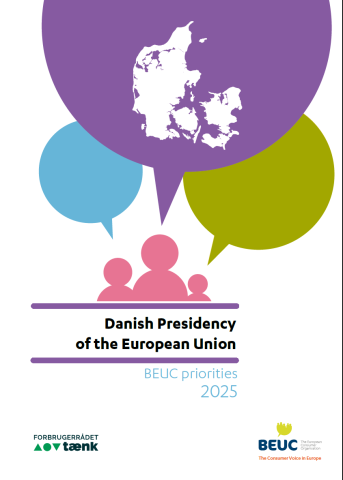Memorandum for the Danish Presidency, 2025
Published on 19.06.2025
About this publication
Numerous legislative and non-legislative files of relevance to consumers will be on the Danish Presidency’s agenda, including files from the previous mandate that need to be finally concluded or approved. We expect the Danish Presidency to help to finalise them in a way that benefits consumers.
We would like to draw your particular attention to the following initiatives:
- Green Claims Directive: The proposed Directive should protect consumers from unverified claims and require companies to substantiate claims before they can be made public and put on the market. It should ensure that green claims are robust and trustworthy.
- Payment Services Directive and Regulation: Consumers are increasingly exposed to all sorts of online payment fraud so that it is becoming very difficult for them to know whether a transaction is legitimate or not. The review of the Payment Services Directive and Regulation offers a unique opportunity to develop a strong consumer protection framework against payment fraud and other fraudulent practices.
- Reform of EU Customs Policy: The reform aims to enhance consumer protection against dangerous products sold online and imported from outside the EU. Additionally, it should strengthen the enforcement of EU environmental standards, including Ecodesign, fostering more sustainable choices for consumers. It could also introduce handling fees to help customs authorities cope with the
overwhelming volumes of e-commerce flows. These handling fees would be supported by importers,
not consumers. - EU´s general pharmaceutical legislation: The revision brings the opportunity to enhance access to more affordable medicines. Consumers across Europe encounter obstacles when attempting to obtain medication necessary for improving their health. Medicines are either unavailable at pharmacies due to supply disruptions or are not reimbursed by public health agencies due to excessively high prices.
- Critical Medicines Act: The Commission’s proposal aims at strengthening supply security for critical medicines and at enabling joint procurement for treatments for which there are inequalities in access. For example, medicines for rare diseases.
- REACH revision: The revision of the EU’s most important chemicals legislation, REACH, should better prevent exposure to harmful chemicals, including by enhancing enforcement at the EU’s borders and on online marketplaces. In parallel, the EU’s efforts to simplify chemicals legislation overall should in no way lower protection standards.
- Alternative Dispute Resolution: The proposal to review the current Directive aims to modernise and simplify rules on out-of-court dispute resolution as well as to adapt them to digital markets and
empower consumers in the digital transition. - The revision of the Package Travel Directive and the Passenger Rights initiatives: The Air Passenger Rights revision and the proposals published as part of the ‘Passenger Mobility Package’ in
2023 should be reviewed consistently and provide a high level of consumer protection. - AI Liability Directive: Although the Commission announced the withdrawal of its proposal, the EU needs to urgently modernise and further harmonise its civil liability rules to be better suited to the
digital era. This initiative must ensure that consumers suffering harm from an AI system have access in practice to justice and redress. - Savings and Investments Union: The objective is to incentivise consumers to invest their savings and to improve investment outcomes. Besides encouraging cross border competition, a low-cost saving and investment product for consumers would help to achieve these aims and tackle the increasing pensions gap.
- The upcoming CAP reform: The next CAP reform needs to become much more targeted and ensure that it aligns better with consumer priorities and expectations for subsidies, including a fairer distribution of the funds as well as rewarding farmers who make the effort to farm in more environmentally friendly ways.
- EU’s response to US tariffs and regulatory pressure: The US are using tariffs as a coercive tool to obtain greater market access to the EU. This coercion includes pressures to adapt EU laws and weaken consumer protections. The EU must stand firm in enforcing its laws and prevent damages to consumers when designing its counter measures.
Download:
Image

19.06.2025
- PDF Document - 720.97 KB
Available in English

